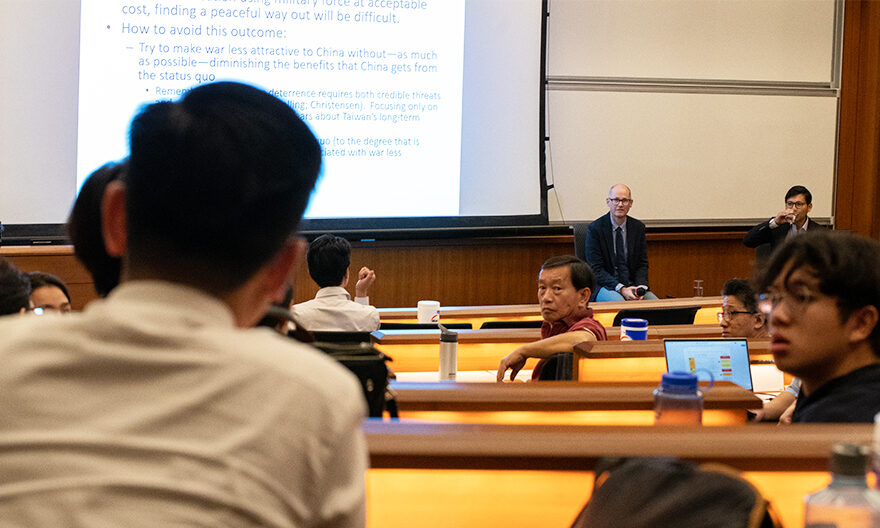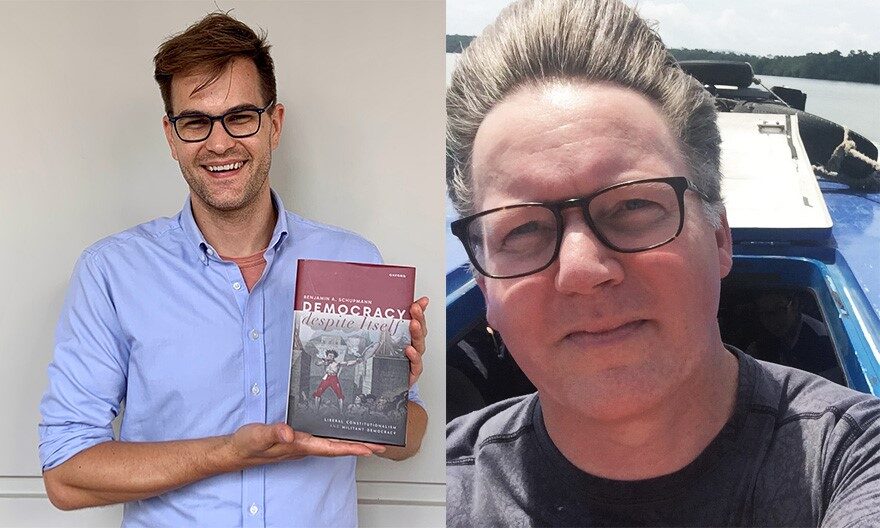Anthony Chen reflected on a filmmaker’s life

“This is a very exciting time for cinema in Singapore,” award-winning director Anthony Chen told the crowd of students, staff, faculty and members of the public at a public lecture hosted by Yale-NUS College on 5 November 2013. But what he did not mention was obvious to most in the room – perhaps the most exciting thing that has happened to Singaporean cinema is none other than the man himself.
Fresh off a triumphant showing of his latest film, Ilo Ilo, at the Cannes Film Festival, which netted him the coveted Caméra d’Or award for the best first feature film, Mr Chen told the story of his progression from aspiring filmmaker in Singapore’s heartlands to his directorial success, offering the audience an up-close and personal glimpse into the sometimes rewarding, often brutal, and always challenging world of filmmaking.
Mr Chen’s passion for film has led him to take risks and buck convention. Born in 1984 in Singapore, and a former student at Nan Hua secondary school, Mr Chen discovered a passion for cinema after watching films such as The Last Emperor as a child. He started fantasising about attending foreign film schools, and even bought the ‘Insider’s Guide to Filmmaking’ in a bid to pursue his dream. What seemed to be a natural choice to Mr Chen when he chose to attend Ngee Ann Polytechnic, the only school in Singapore offering film and media studies in the early 2000s, surprised his parents, classmates and teachers nevertheless. It was not a popular option at the time, Mr Chen recounted, but cinema took on a personal importance for him as it provided a therapeutic avenue of expression for emotions and significant experiences.
Mr Chen’s breakthrough came via a short film he made while in National Service. Titled Ah Ma (or ‘Grandma’ in Chinese dialect), the film not only helped him “move on” from the death of his grandmother, but went on to become the first Singapore short film to be selected for the Cannes film festival. “For every film I make from here, I received some sort of distinction, which made me think that maybe I have some talent,” Mr Chen said. What followed was a sequence of films—Haze, Hotel 66, Lighthouse, The Reunion Dinner—in which Mr Chen explored “how I can grow as a filmmaker, how I can expand my canvas, and slowly upscale my projects”.
In spite of his intense passion and tremendous talent, Mr Chen was not spared from hardships throughout this career. After completing graduate study of film in the United Kingdom, for instance, Mr Chen went into significant personal debt in order to make a film to his satisfaction. “That was the lowest point in my life,” he shared. Despite his success, he was unable to support himself and had to consider getting a “real job”. But his passion for film and cinema sustained him, and after paying off this debt through a series of smaller projects, Mr Chen felt ready to undertake his first full-length film—Ilo Ilo.
Like so many others of Mr Chen’s works, Ilo Ilo, which was publicly screened by Yale-NUS College the day before his public lecture, was inspired by a personal emotional journey. Described by Mr Chen as a “humble” story about growing up, and based on Mr Chen’s own memories of his family’s Filipino maid, Ilo Ilo resonated with audiences in Singapore and abroad with an unanticipated universality.
“Films can be controversial, intellectual, artistic, but the core of filmmaking is emotion…. about connecting with the audience,” Mr Chen said. Ilo Ilo “is domestic, small, and delicate”, because Mr Chen believed that “cinema is not about being sentimental”. By not indulging in inauthentic emotionality, Mr Chen believes that Ilo Ilo managed to capture the “brutal unsentimentality” of life, the “pain and grit” that struck audiences around the world as emotionally honest. And this, Mr Chen believed, had been a hallmark of his progression as a filmmaker.
Despite his successes, Mr Chen was quick to add that filmmaking was not all that easy or glamourous. “Filmmaking is painful. It’s not just a few minutes of lights, camera, action, but rather months of brutal work for a few short minutes of product. The only way you can make your way as a director is if you have a real love for cinema. An aspiring director must be wary of being more in love with the idea of being a filmmaker than being in love with filmmaking, because if you don’t love cinema, it will leave you broken – it’ll break your pocket and then break your heart,” Mr Chen said.
Responding to a question at the end of his lecture, Mr Chen said that while he wished “it would have been easier to make the film, a lot of good work comes out of difficult situations”. Ilo Ilo certainly stood out as an example of the “good work” that he has been delivering. And as Mr Chen continues to make more films, perhaps his example will inspire future generations of Singaporean directors to enchant the world with their own stories.
—
Mr Anthony Chen’s public lecture was held as part of the Yale-NUS President’s Speaker Series, aimed at showcasing accomplished and talented luminaries from around the world. The public lectures are designed for a broad audience, enabling the community to learn from and engage with some of the brightest academics and practitioners in a diverse range of disciplines on contemporary issues in our world today.





